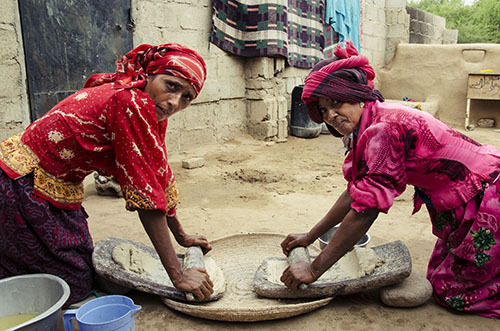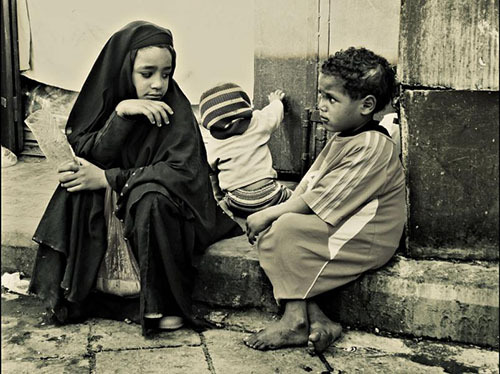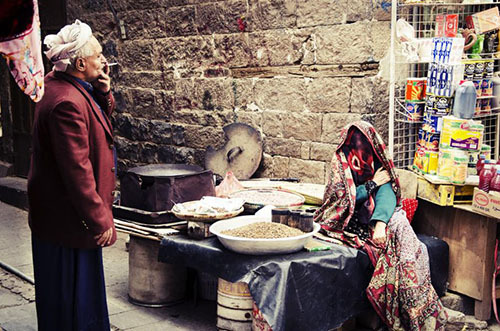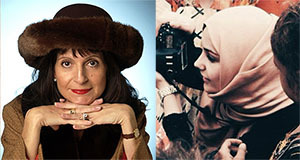
And Thana Faroq is proving it to audiences all over the world with her powerful photography. 塔娜(Tana)解釋說她的藝術讓她 “消除無知, 教育和啟發, even during times of war.” Born and raised in Yemen, Thana was granted a scholarship at the age of 16 to finish high school in Canada, where she completed the IB Diploma Programme. Obtaining a second scholarship, she travelled to the U.S. to study International Relations and Photography at Clark University.
It is my great pleasure to welcome Thana Faroq to 全球搜索教育. 在後面的面試, Thana talks about storytelling through pictures, the role her education played in her incredible journey as an artist, the capacity of the human spirit to prevail, and her big dreams for life moving forward.
What kinds of things are learned by paying attention to street life that are not learned from other sources?
You learn a lot just by observing everyone in the street. People’s spirit and energy are always inspiring. It’s a life that doesn’t stop; there’s something about the unscripted and dynamic moments that can provoke, 啟發, or even disturb you. I think I have seen some of the best and worst of humanity since I became a street photographer.
還, in the streets in Yemen where daily life is beyond difficult, 我了解到人類精神難以置信的延續能力. I’ve learned about resilience and strength.
You also get to develop special skills in communicating with and loving people, and interacting with them. 對我來說,, there are things in the streets that are far more important than capturing the right moment. Sometimes it’s about making the connection with people out there.

Are there other ways of documenting street life that interest you beside photography?
Currently no, but when I was younger, I used to love writing. I would keep a journal and write about everything that really mattered to me. Street life was among the things I would write about — the people I met and the conversations I would have with them. Sometimes I would take public transportation just so I could listen to people’s stories on the bus. I would enjoy their talk about everything — 政治, 家庭, the jokes and the complaints about life. I used to write about it all. Now when I think about it, maybe this was my early documentation of street life. But I felt that words were limiting, they didn’t resonate like photos. They don’t give the instant feelings of the sweet and sorrow that our lives may lead us into. So writing alone was no longer an exciting process and I had to combine it with photography.
What is it about diversity in the kinds of stories we tell children that is especially enriching to their lives?
We all love stories and to a certain extent we were influenced by our bedtime stories. Right? This is important because our children will be raised on stories that they can learn from and relate to, and that will make them think and question the things around them. Stories that cross cultural barriers can describe realities to them and bring new perspectives to their little worlds. They will grow up with real values of tolerance, love and understanding.

What kind of insight into the lives of a community is gained by seeing a photo of it? What is lost?
I believe that photos are the perfect form to teach us something beyond what is visible to us. You can learn a lot about communities, 文化, and people just by “讀” the images of them. Photos of a certain community will inform you about its life conditions and ways of living. Sometimes the photo will communicate to you a special experience that you aren’t aware of. 在某些情況下, it will erase a misconception you had about the people in the photo. Photos will not transcend everything of course, but you will get the flavor of what makes communities unique.
然而, I believe that art is subjective and the camera can be misleading. Maybe the story in some photo isn’t the best — or let’s say it’s not an accurate representation of the people in a community. 在這種情況下, the truth is lost in here. This is why I talk about “讀” a photo, which implies that we make an effort to understand and question photos and the stories they carry to us.
What can we learn from your story? How do we get better at supporting the artistic passions of young people around the world?
Passion has been the driving motive for everything I do. It’s the power that keeps me going in the face of daily life struggles. It’s the motive to challenge the status quo and face the current unfortunate events in my country. When people ask me how am I not afraid of photographing in the streets, I simply smile; I can’t be afraid — I am motivated and I trust my camera. And this is what I want people to learn: to trust their passion, to respond to it with hard work and perseverance because it pays off.
In the case of fine art and photography, there are many great emerging and passionate young artists that people aren’t aware of. It’s unfortunate that we only praise and recognize those who are already established. There’s nothing wrong in looking at how the young generation is expressing themselves. Why don’t we give them the opportunity to examine their talents and to share their stories? Let’s be curious about them. Some of these great talents get buried with time because they haven’t received the necessary attention they need to carry on.

You have said that your education enabled you to do what you do now. Can you explain why you believe this?
By the time I returned home, my interest in street photography had grown, but I knew it was going to be a great challenge. 然而, the strength I developed through education allowed me to break barriers and it was my motivation to keep going. My IB education and university degree provided me with unique opportunities to discover myself and to find my true passion.
So often I wonder, what if I didn’t have this strong educational background? Would I be the same person today? Maybe, but I wouldn’t have the capacity, the skills and the weapons to be the artist and the woman I desired to be.
My education experience abroad changed my life; it gave me the courage to confront people in the streets who I no longer call strangers. I’m equipped with confidence; I wasn’t scared to document street life in times of war because through education I learned the true meaning of creativity, which is creating the individuals who would make a difference in the world. The world can be as small as their personal life or as big as the physical world itself. The context doesn’t matter. 對我來說,, it is Yemen at the moment.
What’s next for Thana Faroq – where do you see yourself 5 從現在起十年?
I am very inspired by universally recognized photographers such as Steve Muccary, Jimmy Nelsson and Lisa Kristine who traveled the world to capture the essence of human struggle and joy everywhere they went. 從現在起五年, maybe I would have a similar experience and become an international photographer touring the globe. I want to explore other communities and cultures and produce iconic images that make an impact and influence the way people see certain things in their societies.

(All photos are courtesy of Thana Faroq)
和我一樣,全球知名的思想領袖,包括邁克爾·巴伯爵士 (英國), 博士. 邁克爾座 (美國), 博士. 萊昂特司特因 (美國), 克萊克里斯坦森教授 (美國), 博士. 琳達·達林 - 哈蒙德 (美國), 博士. MadhavChavan (印度), 邁克爾·富蘭教授 (加拿大), 霍華德·加德納教授 (美國), 安迪·哈格里夫斯教授 (美國), 伊馮娜赫爾曼教授 (荷蘭), 克里斯汀Helstad教授 (挪威), 讓·亨德里克森 (美國), 玫瑰Hipkins教授 (新西蘭), 科妮莉亞Hoogland教授 (加拿大), 這位傑夫·約翰遜 (加拿大), 太太. 尚塔爾考夫曼 (比利時), 博士. EijaKauppinen (芬蘭), 國務秘書TapioKosunen (芬蘭), 多米尼克·拉方丹教授 (比利時), 休·勞德教授 (英國), 主肯麥克唐納 (英國), 傑夫大師教授 (澳大利亞), 巴里McGaw教授 (澳大利亞), 希夫納達爾 (印度), Ř教授. 納塔拉詹 (印度), 博士. 吳PAK (新加坡), 博士. 丹尼斯教皇 (美國), 斯瑞達拉賈戈帕蘭 (印度), 博士. 黛安·拉維奇 (美國), 理查德·威爾遜·賴利 (美國), 肯·羅賓遜爵士 (英國), 帕西SAHLBERG教授 (芬蘭), 押尾佐藤教授 (日本), 安德烈亞斯·施萊歇 (PISA, 經合組織), 博士. 安東尼·塞爾頓 (英國), 博士. 大衛·謝弗 (美國), 博士. 基爾斯滕都沉浸式 (挪威), 總理斯蒂芬·SPAHN (美國), 伊夫Theze (LyceeFrancais美國), 查爾斯Ungerleider教授 (加拿大), 托尼·瓦格納教授 (美國), 大衛·沃森爵士 (英國), 迪倫Wiliam教授 (英國), 博士. 馬克沃莫爾德 (英國), 西奧Wubbels教授 (荷蘭), 邁克爾·楊教授 (英國), 和張民選教授 (中國) 因為他們探索所有國家今天面臨的大畫面的教育問題.
全球搜索教育社區頁面
ç. M. 魯賓是兩個廣為傳誦的在線系列,她接受了筆者 2011 厄普頓·辛克萊獎, “全球搜索教育” 和 “我們將如何閱讀?” 她也是三本暢銷書, 其中 真正的愛麗絲夢遊仙境, 是的發行 CMRubinWorld, 而且是干擾物基金會研究員.






最新評論